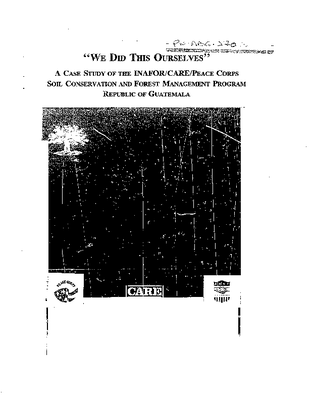We did this ourselves- a case study of INAFOR/ CARE/Peace Corps soil conservation and forest management program, Republic of Guatemala
This USAID evaluation considers soil conservation and forest management programs in the highlands of Guatemala from 1979-1987 by three cooperating institutions of the ICCP: the Guatemalan National Forestry Institute (INAFOR), CARE, and the U.S. Peace Corps. The ICCP program focused on improving the well being of Guatemalan subsistence farmers through introducing soil conservation techniques and on-farm tree planting. USAID provided support through Food-for-Work donations. Food-for-Work was supplied by USAID via CARE as an incentive for subsistence farmers to implement soil conservation and reforestation practices on individual and communal lands. Soil conservation activities included bench terraces, gully reclamation, infiltration ditches, live and dead barriers, and composting. Reforestation included agroforestry, forest tree and fruit tree nurseries, live fencing, fuelwood and timber plantations, and watershed reforestation. Over ten thousand farmers in 393 communities in 13 Guatemalan departments participated in the program. Success of the ICCP program was attributed to (1) the effective cooperation of the three member organizations, (2) securing community involvement by the engagement of local extensionists, and (3) the adaptive approach of the ICCP program. Extensionists were selected from local communities, which contributed greatly to their effectiveness. The ICCP offered employment, training and education to the extensionists. Community training was noted as a critical element of program success. The transfer of training to farmers by locally hired extensionists and farmer-to-farmer extension were found very effective means of promoting appropriate technologies. Landowners reacted adversely to ICCP focus on the creation of woodlots and forest plantations by planting trees on marginal lands. The ICCP then adopted an agroforestry strategy, for integrated production from existing agricultural fields. The adaptation of tree species and reforestation techniques to local conditions fostered broad adoption of tree planting, which has had positive economic impacts on the farm communities and reduced deforestation and fuelwood demands on natural forests. Commitment by the government of Guatemala to the program via INAFOR of some $30,000/yr. provided credibility and long-term support to the communities. This support was deemed critical to continued local involvement in the programs. The authors suggest that Food-for-Work can be a powerful tool in natural resource projects when accompanied by proper planning, clear goals, and sustained, quality extension work. ICCP Food-for-Work fostered: Participation in soil conservation/agroforestry practices with long-term benefits; Decreased migration; Cooperation among landowning and landless farmers; eased harvest yields. Disadvantages included: Interest only in the food; Poor recognition of the benefits of the natural resource techniques; Minimal interest by wealthy farmers.
https://biodiversitylinks.org/library/resources/rmp/library/content/tools/community-based-natural-forest-management-USAID-Lessons-Learned/cbnfm/USAID-BDB-cd-2-data/we-did-this-ourselves-a-case-study-of-inafor-care-peace-corps-soil-conservation-and-forest-management-program-republic-of-guatemala/view
https://biodiversitylinks.org/library/resources/rmp/library/content/tools/community-based-natural-forest-management-USAID-Lessons-Learned/cbnfm/USAID-BDB-cd-2-data/we-did-this-ourselves-a-case-study-of-inafor-care-peace-corps-soil-conservation-and-forest-management-program-republic-of-guatemala/@@download/image/image.png
File
We did this ourselves- a case study of INAFOR/ CARE/Peace Corps soil conservation and forest management program, Republic of Guatemala
Author(s):
Nations, James D.,
Burwell, Bruce B.,
Burniske, Gary R.
Publication Date: 1987
Location: Guatemala
DOWNLOAD FILE
This USAID evaluation considers soil conservation and forest management programs in the highlands of Guatemala from 1979-1987 by three cooperating institutions of the ICCP: the Guatemalan National Forestry Institute (INAFOR), CARE, and the U.S. Peace Corps. The ICCP program focused on improving the well being of Guatemalan subsistence farmers through introducing soil conservation techniques and on-farm tree planting. USAID provided support through Food-for-Work donations. Food-for-Work was supplied by USAID via CARE as an incentive for subsistence farmers to implement soil conservation and reforestation practices on individual and communal lands. Soil conservation activities included bench terraces, gully reclamation, infiltration ditches, live and dead barriers, and composting. Reforestation included agroforestry, forest tree and fruit tree nurseries, live fencing, fuelwood and timber plantations, and watershed reforestation. Over ten thousand farmers in 393 communities in 13 Guatemalan departments participated in the program. Success of the ICCP program was attributed to (1) the effective cooperation of the three member organizations, (2) securing community involvement by the engagement of local extensionists, and (3) the adaptive approach of the ICCP program. Extensionists were selected from local communities, which contributed greatly to their effectiveness. The ICCP offered employment, training and education to the extensionists. Community training was noted as a critical element of program success. The transfer of training to farmers by locally hired extensionists and farmer-to-farmer extension were found very effective means of promoting appropriate technologies. Landowners reacted adversely to ICCP focus on the creation of woodlots and forest plantations by planting trees on marginal lands. The ICCP then adopted an agroforestry strategy, for integrated production from existing agricultural fields. The adaptation of tree species and reforestation techniques to local conditions fostered broad adoption of tree planting, which has had positive economic impacts on the farm communities and reduced deforestation and fuelwood demands on natural forests. Commitment by the government of Guatemala to the program via INAFOR of some $30,000/yr. provided credibility and long-term support to the communities. This support was deemed critical to continued local involvement in the programs. The authors suggest that Food-for-Work can be a powerful tool in natural resource projects when accompanied by proper planning, clear goals, and sustained, quality extension work. ICCP Food-for-Work fostered: Participation in soil conservation/agroforestry practices with long-term benefits; Decreased migration; Cooperation among landowning and landless farmers; eased harvest yields. Disadvantages included: Interest only in the food; Poor recognition of the benefits of the natural resource techniques; Minimal interest by wealthy farmers.



